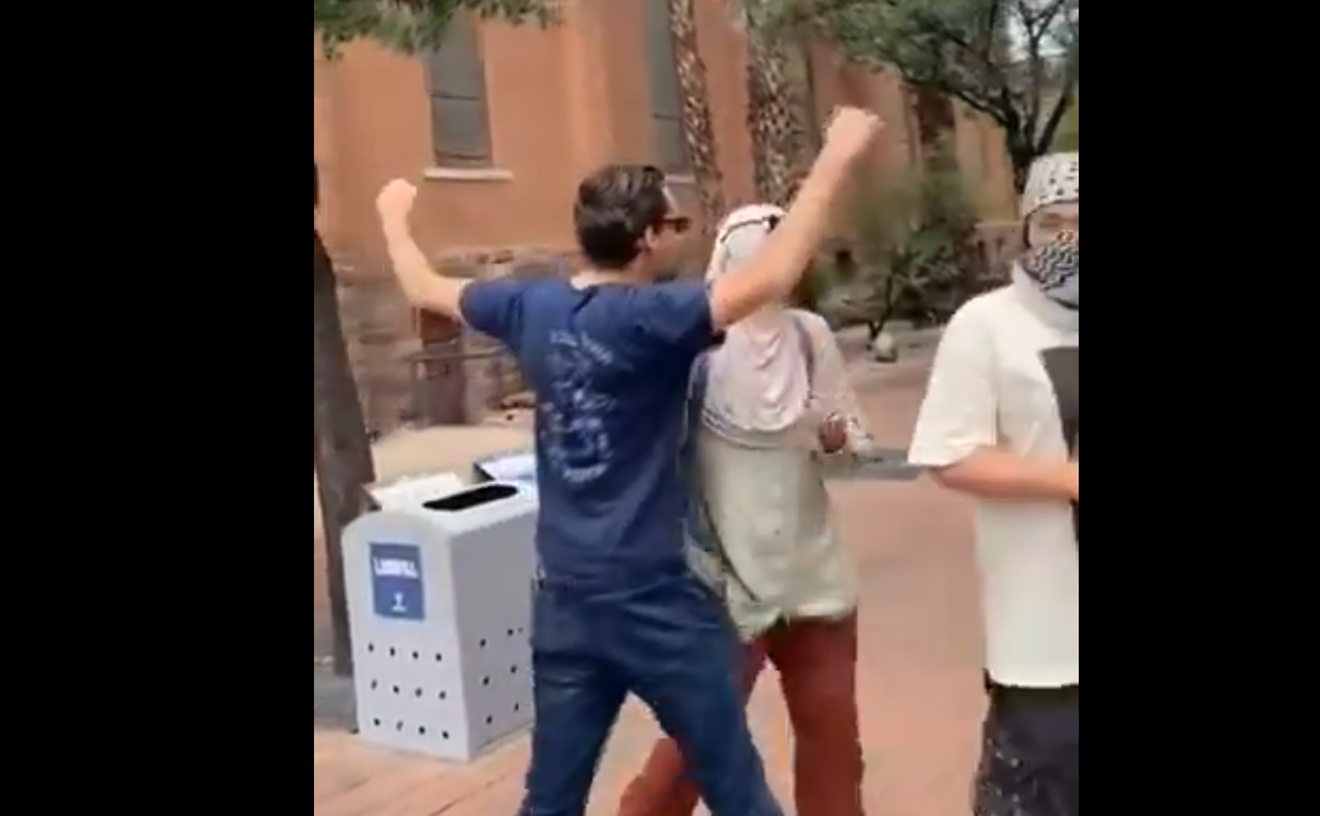As New Times reported on Friday, Arizona State University officials demoted Whitaker to associate professor and made him co-director of the Center for the Study of Race and Democracy, which he founded, after an investigation found "significant issues" with his 2014 book, "Peace Be Still: Modern Black America from World War II to Barack Obama."
Additional records obtained by New Times on Monday detail the strong concerns by two academics who reviewed the book for plagiarism at ASU's request, including the findings that Whitaker had a "recurring disregard" for the authors of original material, and that the integrity of his entire book was in doubt.
On May 13, two weeks after Whitaker was informed he'd be disciplined for his bad scholarship, the professor's company, Whitaker Group, LLC, won a $268,000 contract with Phoenix to teach diversity training to the departments roughly 3,000 police officers. As our previous story covered, Assistant Chief Mike Kurtenbach told the city council that Whitaker needed to be hired quickly, and that staff had looked at his qualifications.
DiCiccio has requested all public records in the case from Phoenix, and demands that Whitaker's bid be canceled immediately.
"Phoenix police insisted that this contract was thoroughly vetted, which now turns out to be false," the councilman wrote in a statement emailed to the media on Saturday. "The Council and the public were duped into believing this was a non-issue, which is now clearly not true. Those who pushed for this contract should be fully held accountable."
Whitaker had been accused in 2011 of plagiarism, but an ASU investigation determined that Whitaker's use of source material without proper attribution was unintentional. That finding was received poorly by at least one ASU official, Monica Green, who resigned her post on a tenure-review committee in protest.
"Phoenix police administration in particular, Commander Kurtenbach, either knew his testimony was false or he was misled by the sole bid contractor," DiCiccio claims in his letter to Phoenix City Manager Ed Zuercher.
Phoenix police are discussing what to do, according to Sergeant Vince Lewis, a department spokesman:
"The training provided by Dr. Whitaker has been underway since April of this year as part of a 40-hour Module provided to our employees. We are currently on Summer break as a large portion of the training takes place outdoors. The training is not scheduled to resume until August. The goal for departmental training has been to provide useful, timely, and relevant topics in law enforcement, which Dr. Whitaker has been able to provide in his portion of the 40 hour Module to this point.Whitaker's salary has been reduced by $10,000 to about $154,000, and he loses $10,000 of a $20,000 stipend from his race-relations center. He's also not scheduled to teach any classes next semester.
"We are aware of the situation and will be working with ASU to determine exactly what has taken place. This is an important issue to the City, our department and our community. Discussions on the matter will take place this week now that Chief Yahner has returned from an out-of-town city business trip."
At the request of ASU, Karin Ellison, associate director for the Center for Biology and Society at ASU, and Professor Keith Wailoo, a noted history professor at Princeton University, were asked in late 2014 and early 2015 to scrutinize complaints about Whitaker's book.
Ellison, in an undated letter to ASU officials (obtained by New Times on Monday from ASU), states that she's "disappointed to find features that may be plagiarism" in his 2014 book.
She identified the likely plagiarism in examples given by the anonymous blog, "The Cabinet of Plagiarism," which has attacked Whitaker — often by way of personal insults — since his book was published. Not only do "identical phrases" turn up both in Whitaker's book and his often unattributed source material, she wrote, but sometimes "main elements" discussed in the book are "parallel" to those found in other sources.
Ellison suggested that ASU could opt to investigate the book more thoroughly. She recommended a "systematic review" by a small team of professionals, including a "senior scholar" on African-American studies.
Wailoo, in a January 9 letter to an ASU official, stated that he was asked to review the "Cabinet's" allegations, Ellison's findings, plus a new copy of the book that contains changes requested of the publisher by Whitaker. He does a good job explaining the various kinds of plagiarism that can occur: sloppiness, the "purposeful taking of phrases, arguments, ideas and verbiage from other sources" and presenting them as one's own, and when publishers try to appeal to non-scholarly audiences by asking authors to narrow or even strip out attribution to other sources. He also mentioned that because "Peace Be Still" is a textbook, it's allowed to draw from "existing scholarship" in way that a "scholarly monograph" (a.k.a., a wholly original, non-fiction book) doesn't have to. Still, "rules of attribution cannot be ignored."
"Based on my assessment, I conclude that the author of 'Peace Be Still' failed in numerous instances to follow the standard rules of attribution, even for a history textbook," Wailoo wrote in his five-page report. Whitaker's practice "appears to be one of copying several sentences from another source, modifying those sentences slightly, avoiding quotations, retaining the overall structure and argument of the original source, and either neglecting or avoiding citation. The pattern of this practice is sporadic but repeated; it shows a recurring disregard for crediting the original author of the idea."
In a July 1 apology letter to ASU faculty, Whitaker called the discrepancies "mistakes."
Since the allegations arose, Whitaker asked publisher University of Nebraska Press to make "extensive revisions" to the book, offering up previously unknown examples of apparent plagiarism, Wailoo stated. Yet as Wailoo notes of one example, Whitaker's request for changes on a section about "freedom rides" merely included dropping in some quotes around part of a sentence.
"This fix does not fully acknowledge that the entire section" in question was likely lifted from a section on freedom rides published on BlackPast.org, Kailoo wrote. In any case, the source "does not appear to be credited in Dr. Whitaker's revised version" of his book, he added.
In other words, Whitaker's revising practices need revising.
Wailoo wrote that Whitaker identified "many of these citation problems" while in talks with the publisher on an updated book, including passages lifted from TheFamousPeople.com, Africanamerican.org, and an obscure blog site.
The many troubling examples "cast a shadow" over the quality of the book's scholarship, and corrections proposed by Whitaker "do not sufficiently or effectively address the core issue of the book's indebtedness to other sources," Wailoo wrote.
A full investigation of the book was never requested by ASU. Whitaker sent a March 7 letter to officials apologizing for the "errors," which he claimed were due to his very busy schedule.
"Prior to publication, I personally ran the entire book through two separate plagiarism detectors" but no problems turned up, he asserted.
DiCiccio stepped up his criticism of the police-contract deal on Monday evening, releasing the above-mentioned documents plus a May 1 letter from ASU Senior Vice President Sethuraman "Panch" Panchanathan that wasn't included in the public-records release from ASU. We asked the university's communications office about that — spokesman Gerardo Gonzalez said more documents related to the case will be forthcoming.
Panchanathan, in the letter, told Whitaker that the inquiry into plagiarism allegations was complete, and that his book contained "troubling examples" of likely plagiarism.
As "deciding official," the discipline fell to him, he explained. Panchanathan ordered Whitaker to request withdrawal of the current book (which is still available from the publisher in paperbook) and to work with the publisher, if necessary, on a newly-revised edition that mentions "the book's reliance on other works, the corrections needed and explanation why."
For some reason, mainly because of the lack of a complete investigation, ASU's trusting Whitaker to make all the necessary corrections and revisions. Whitaker's also supposed to apologize to the authors from whom he used unattributed material, and take other conciliatory steps including the preparation and publication of "a response to the articles that drew attention to the situation." It's unclear how much of that has been done. But Panchanathan wanted proof that Whitaker had completed most of the items on the checklist by May 15.
DiCiccio sees the document as evidence of some sort of corruption.
"Phoenix Police either purposely rushed this contract before the plagiarism charges went public or they misled the public with their claims of completing their due diligence," the councilman said in a written statement. "In each case they caused a waste of taxpayer dollars and must be held accountable. Things like this do not happen in a vacuum. The first thing that must be done is that this contract must be terminated and it must be terminated now-today. The letter speaks for itself."
Whitaker, reached by email, didn't want to discuss any more details of the case. He tells New Times:
"The issue at ASU has been resolved and I won't be commenting on it further. The issues facing our communities, especially racial tensions and the need to build bridges between law enforcement and community, are larger than me. No city is immune to racial eruptions and a Ferguson-like conflict here would be disastrous. The safety our our officers and communities is very important to me. If we address these issues with clarity and purpose, however, Phoenix can be a model for other cities to follow."We asked him further about his accusation three years ago that racial bigotry played a role in the complaints against him, and whether he still felt that way. Whitaker said he didn't make the accusation lightly.
"I'm sorry, I can only refer you to the full 2011 report. I'm no longer discussing 2011," he writes. "I am discussing the merits of understanding culture to build community now."
DiCiccio's office also referred New Times to the May 13 council meeting in which Whitaker's six-digit contract was approved. In the video, Councilwoman Thelda Williams mentioned that she's received a complaint about Whitaker and asked the council to table the approval vote until the matter could be resolved.
Milton Dohoney Jr. Assistant City Manager Dohoney explained that the training has already started.
"We've not been presented with any questions up until this point, so I don't know what the nature of the issue is," Dohoney said. He said the training would continue even if they don't approve it.
But after DiCiccio added that he's also received a message about Whitaker's possible plagiarism, that they're "pretty serious allegations," and that he'd like a report from staff about the issue, Dohoney remembers that Whitaker may have had some critics. Now that he understands what DiCiccio's talking about, he said at the council meeting, he stated that, "We did factor that in in the decision that we made to go with this particular person. This is person is a member in good standing with Arizona State University. It has not impacted his tenure, it has not impacted his role within the university."
Because he hadn't been disciplined, "we had no reason to discount him, and therefore we went forward," Dohoney said.
At 28:53 in the video, Mayor Greg Stanton tells the council that since the allegations from "years ago," Whitaker was "significantly promoted" by ASU and was the director of the Center for the Study of Race and Democracy. Stanton dismisses the allegations.
"Dr. Whitaker is one of the most outstanding people I know in this community," he said, discussing how important he believed the training would be for police. "I personally believe that there is no reason to delay this and not to move forward today."
The council ultimately approved the contract in a 4-0 vote.
Got a tip? Email Ray Stern
Follow Ray Stern on Twitter: @RayStern
Follow Valley Fever on Twitter: @ValleyFeverPHX











